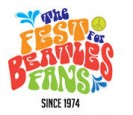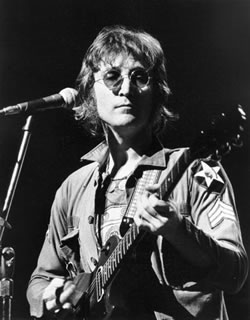By Danny Abriano
As a Beatles fanatic who was born three years after John Lennon was senselessly taken in December of 1980, I’m often bothered by the fact that I never shared the world with John. Since The Beatles formed and broke up before I was born, I also think about all of the “what ifs.” One of the most pondered, of course, is “what if The Beatles had gotten back together?”
During John Lennon’s “Lost Weekend” – the time he spent away from Yoko Ono from the summer of 1973 to early 1975 – he was with May Pang (and many others), and reportedly gave serious thought to a reunion with Paul and the rest of the group.
Before delving into the potential Beatles reunion, though, it’s important to discuss why the Lost Weekend came about in the first place.
John’s marriage to Yoko was floundering, and Yoko basically chose May Pang – who was an employee of theirs – as a lover and companion for John to have during their time apart. John spent lots of The Lost Weekend in Los Angeles, with friends such as Mal Evans and Harry Nilsson.
This month in 1974, one of the most infamous events of The Lost Weekend took place – the night John and Harry Nilsson were kicked out of the Troubadour Club for heckling the Smothers Brothers. As the story is told in “Lennon In America” by Geoffrey Giuliano:
One evening, Lennon, along with May Pang and Harry Nilsson, arrived at the Troubadour around midnight to catch the opening night of the Smothers Brothers act. Already overloaded on Brandy Alexanders, John became immediately disruptive, joining Harry in a cacophonous songfest and hurling a stream of obscenities at the Smothers. Events took a nasty turn when the duo’s manager Ken Fritz confronted an out-of-control John and hauled him from his seat. Lennon exploded, overturning the table and the pair exchanged a few halfhearted fisticuffs. Lennon and company were literally thrown out the door where they tumbled into a party of incoming patrons, touching off a full-blown street brawl. The incident made worldwide headlines the following day.
While the Troubadour incident sheds light on how wild Lennon could be during the Lost Weekend, not every moment was dedicated to debauchery.
During this time, Lennon completed three solo albums (“Mind Games,” “Walls and Bridges,” and “Rock ‘n’ Roll”), produced the “Pussy Cats” album for Harry Nilsson, and wondered aloud about a potential Beatles reunion. As May Pang told it:
John really thought about it at one point, and we were considering it early on in ’74, just for the hell of it. Harry Nilsson wanted to be a part of it. We said, oh, that would be a good idea—a one-off, and we would do it in the fall. We were thinking about upstate New York, like Syracuse, because Ringo couldn’t be in New York City…we had been hanging out with Ringo a lot in L.A., and it just came out of conversation, hanging out: ‘Oh, wouldn’t it be great if we did this one gig,’ and they’d start talking about it. ‘Yeah, well, why don’t we do this, and George would do that, and Paul. . .’ So it was just thrown around, and everybody was like, well. . .let’s do that.
In addition to his words to Pang, John had also spoken openly around that time about a potential Beatles reunion.
So, why didn’t a reunion happen?
According to Pang, none of the Beatles ever took the lead on hammering out the details. By 1975, John was back with Yoko and at the beginning of a five year break from the music business.
Lennon was at times in the process of losing himself completely while he was away from Yoko during the Lost Weekend, and his decision to get back together with Yoko was his.
However, like many fans unfairly blame Yoko Ono for the breakup of The Beatles, many also claim that her presence prevented any potential Beatles reunion from happening. May Pang supposedly encouraged John to reunite with Paul – something Yoko apparently didn’t do. Still, every choice John made was his.
While a Beatles reunion never took place, John Lennon and Paul McCartney did record together after the breakup. The date was March 28th, 1974, and a John and Paul reunion (with Harry Nilsson, Stevie Wonder and others also playing) came to be during a night of partying in the studio in Los Angeles.
The tape of the session is out there on the bootleg “A Toot and A Snore in ’74,” and is mostly a convoluted mess of voices and noises. Still, it has John Lennon and Paul McCartney playing and singing together four years after the breakup of The Beatles, something that can’t be found anywhere else.
Listening to John and Paul play and sing together on the tapes above is both sad and thrilling at the same time.
It’s just a jam session, and an alcohol and drug fueled one at that. However, it makes me think about what would’ve happened if a legitimate Beatles reunion had ever occurred.
After the breakup, the solo Beatles recorded with one another often, but never recorded as a foursome again. Most notably, John, George, and Ringo played on Ringo’s “I’m The Greatest,” and George, Paul, and Ringo played on George’s tribute to John “All Those Years Ago” after John was killed.
What would’ve happened if the group had gotten back together? Would it have been something that blew up as quickly as it materialized? A one album thing? Something that resulted in a second long-lasting effort? With their legacy already cemented, would it have even been worth it?
I was at Radio City Music Hall in 2010 when Paul surprised Ringo on stage for his birthday and of course sang “Birthday.” No one in the crowd knew Paul was about to show up, and the entire place went into absolute hysterics when Paul’s hofner bass was placed on stage, followed shortly thereafter by Paul running out and grabbing it. When Ringo ran behind the drum kit and sat down to start playing with Paul, it felt as if the mezzanine where I was sitting might collapse.
I had seen Paul in concert before, and I had seen Ringo in concert before. This was different, though. On stage were two Beatles – the only two who were left – performing together. It was more than special – there isn’t really an adequate word to describe it.
What would an official Beatles reunion have done to impact moments like the one above? Watered it down, or somehow enhanced it?










